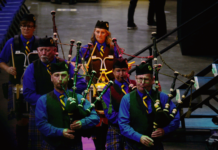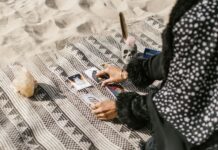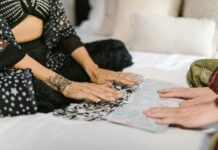On a chilly and blustery Tuesday evening, the Barn opened its doors to an evening of poetry and intersectionality by Sri Lankan author Leah Lakshmi Piepzna-Samarasinha. The dim lights and intimate setting belied the explosive narrative that ensued from Leah’s lips as she read from her two new books “Body Map“ and “Dirty River.“ Clad in a metallic skirt and a denim vest, she was as every bit colorful in her wardrobe as she was with her words. In a deep, hurried voice, she introduced herself and the work that had put out recently and in the past and beckoned the audience to come join her near the front.
As the award-winning poet and writer began the evening’s performance, ASL translators flanked both sides of the stage to sign her words for those who were deaf in the audience, reflecting her strong belief in disability justice. Between poems about being queer, disabled, a person of color and a sexual abuse survivor, Leah took the time to talk about her experiences after her move to Seattle shortly after graduating from college.
In her opening piece titled “Airport Ode #1,” she talks about the trauma of having to go through TSA as a person of color and being regularly patted down by security and pulled aside for questioning. She also discussed her experiences with disability and the work force in “Everybody Thinks You’re Lazy, Don’t Let Them.” Many of her poems also dealt with sex and and her unique intersection between queerness, race and disability.
After completing her segment on her poetry, she read a few excerpts from her memoir “Dirty River” wherein she talked about her experiences while searching for a community of like-minded people of color in Seattle. Her initial endeavors seemed futile in the beginning as she unsuccessfully attempted to find solace in the punk anarchist scene but got tired of arguing with the white patrons that frequented the stores and realized that punks of color and queer people of color were all separated by far flung locations. Instead, she decided to search out ethnic communities and work with other people of color and minorities to build a sense of community.
In a post-performance interview, I was able to ask her about her experiences in writing and how she came to blend the different aspects of her life into a cohesive body of work. She quoted Audre Lorde to explain that “We can’t have single issue movements because we don’t lead single issue lives.”
She went on to talk about how she had been writing since she was a teen and wanted to find a flourishing queer and South Asian community to be a part of following her graduation from university. She loved the mixed community and strong sense of activism and went on to find a community in Toronto and decided to settle down there.
My time spent at the event was not only entertaining, but also incredibly eye-opening. She brought issues plaguing minorities together with the light voice and an easy laugh of an old friend and I left that evening more knowledgeable than before.








